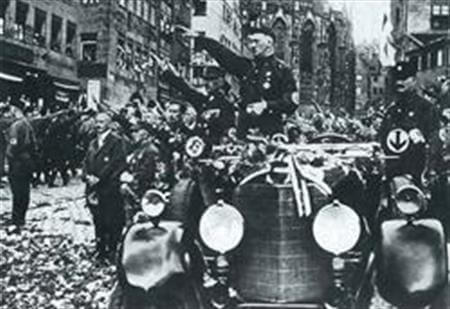
Hitler and the Nazi Party came to power as a consequence of the social, political and economic malaise that characterised Germany in the inter-war period. Many Germans refused to believe that their country had been defeated in World War I. They attributed the defeat and destruction of the German army in the field to the spread of malicious, defeatist thinking and ‘backstabbing’ by Jews on the home front. The Nazis’ rise to power sealed the fate of the Weimar Republic. The Nazis argued that the parliamentary democracy established under the Weimar Republic had been forced upon Germany by the victors and was contrary to German interests and nature. The Nazis bitterly criticised the terms of the Versailles Peace Treaty as being overtly harsh and grossly unfair in the financial and territorial penalties imposed upon Germany. The harsh terms of the peace treaty, the deteriorating economic landscape in Germany after 1929, provided the opportunity for radical right-wing groups like the National Socialists to improve their position through fear mongering and scapegoating — blaming most of Germany’s post-war ills on the Jews.
In 1919 Adolf Hitler, a demobilised and dispirited soldier, joined the fledgling and obscure National Socialist Workers’ Party. He soon emerged as the party’s leader and emphasised its racist ideology, especially its racism against Jews. In 1923, as a result of his participation in a failed anti-government coup in Munich, he was briefly imprisoned. During his incarceration he wrote Mein Kampf (My Struggle), in which he set out his ideas on racial theory and plans for world domination by the German Aryan race.
In the 1932 presidential election, Hitler won 37 per cent of the vote. Although in the July elections the Nazis won 230 seats (the largest party), they still lacked an overall parliamentary majority. However, after much manoeuvring, in the November elections, controlling only 3 out of 11 ministries, the Nazis were able to form a coalition cabinet; and on 30 January 1933, President von Hindenburg proclaimed Hitler Chancellor of Germany.
The following month a suspicious fire destroyed the Reichstag (German Parliament) building, providing Hitler with the opportunity to blame the Communists. Thousands of Communists and liberals were arrested and von Hindenburg signed a decree suspending civil liberties. In the Reichstag elections of March 1933 the Nazis won 44 per cent of the vote, and since the Communists had been banned from parliament, the Nazis together with the DNVP (German Nationalist People’s Party) had the numbers to pass the Enabling Act. This law changed the constitution, introducing the Nazi dictatorship and the Third Reich.
